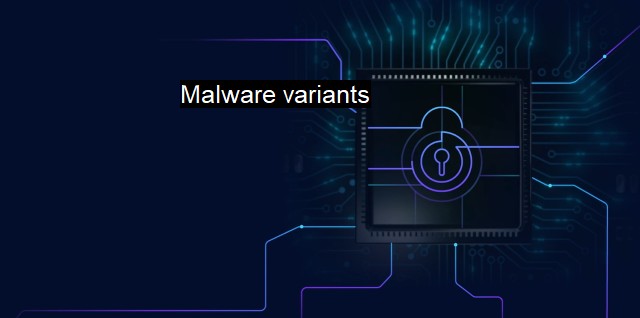What are Malware variants?
Exploring the Threat of Malware Variants: Understanding their Origins, Operations, and Antivirus Solutions
Malware variants refer to different forms or types of malicious software that are developed to inhibit, either in terms of function or distribution, the operation of computer systems, networks, and software. They are created by cyber attackers with the aim to gain unauthorized or invasive access, disrupt, steal, damage, or perform unwanted actions on computer systems. Unbeknownst to many users, malware can come in various variants, each one having a hazardous specialty within the domain of cybersecurity and antivirus applications.One widespread category is the computer virus, an original form of malware that attaches itself to clean files to spread throughout the computer system. Viruses have the ability to corrupt data, slow down the system, and log keystrokes. They have the notorious nature of being highly violent, leading to massive system crashes. They are typically spread by sharing infected files, such as in software downloads, email attachments, or shared network files.
Another malware variant is worms. Unlike computer viruses, worms can replicate themselves to expand over networks, independent of a host program. They can be used for various harmful purposes, such as using up the machine’s available system resources, altering or destroying files, and creating pathways for other malicious programs to infiltrate the system.
Trojan Horses are another prime scorer in the malware variants list. They mislead users about their functions or intentions, appearing legitimate and harmless and then wreak havoc once inside the system. They are designed cleverly to carry out a range of attacks, from data-theft, modification, and deletion to give remote control to the cyber attacker.
Spyware, another variant of malware, is malicious software designed to gather data about a person, network, or organization without their knowledge or consent. It breaches their privacy since if ignored, it can expose a user’s sensitive data and lead to numerous consequences that can damage a person's reputation or finances prominently.
Adware is another variant that infects the system by displaying unwanted ads and pop-ups that direct towards dangerous sites. It serves as a pathway for other malware variants to piggyback into the system, obstructing system functionality and user experien
Ransomware variants are becoming more of a threat. These types of malware block users from accessing their own equipment or files until a ransom is paid. This can happen through various methods, including file encryption or device locking. Unfortunately, paying these ransoms may not guarantee users regain access to their systems or files.
Zero-day exploits are another unnerving variant that exploits a vulnerability in the system that is unknown to its vendors or creators. Given the vulnerability is unknown to the creators, an official patch or way to fix it might not exist until after extensive damage occurs.
In terms of cybersecurity, identifying and protecting systems against these malware variants is crucial. Here’s where we notice the value of efficient antivirus software. An antivirus shields the system by scanning, detecting, and removing different malware variants before they infect the system. It protects vital information and maintains functionality, safeguarding users against potential threats.
Addressing malware threats is not just about individuals and organizations understanding the risks and variants associated with them, but also about implementing effective antivirus measures and preemptive threats response strategies.
With the rapid technological advancements, the malware variants are evolving regularly, becoming sophisticated with time. Each variant poses a unique and growing threat that continually puts cybersecurity defenses under pressure. Hence, it becomes vital for everyone - from normal end users to large organizations - to stay abreast of the evolving challenges of malware and the importance of implementing reinforcement and recovery strategies within their cybersecurity armature. By doing so, they can proactively respond to threats, protect sensitive information, and ensure the continued operation of their systems and networks.

Malware variants FAQs
What are malware variants?
Malware variants are modified versions of an existing malware strain that are created to evade detection from antivirus and other security programs.How do malware variants differ from traditional malware?
Malware variants differ from traditional malware in that they are specifically designed to avoid detection by antivirus and other security software. They may use different encryption methods, stealth techniques or other evasion tactics to avoid being detected.What risks do malware variants pose to computer systems?
Malware variants pose significant risks to computer systems as they can bypass traditional security measures, spread quickly, and cause significant damage to data and systems. They may also install backdoors or other malicious software, allowing attackers to take control of the system or steal sensitive information.How can I protect my computer from malware variants?
To protect your computer from malware variants, it is essential to keep your antivirus software and systems up-to-date with the latest patches and updates. You should also avoid clicking on suspicious links or downloading software from untrusted sources, and regularly back up your data to protect against data loss.| | A | | | B | | | C | | | D | | | E | | | F | | | G | | | H | | | I | | | J | | | K | | | L | | | M | |
| | N | | | O | | | P | | | Q | | | R | | | S | | | T | | | U | | | V | | | W | | | X | | | Y | | | Z | |
| | 1 | | | 2 | | | 3 | | | 4 | | | 7 | | | 8 | | |||||||